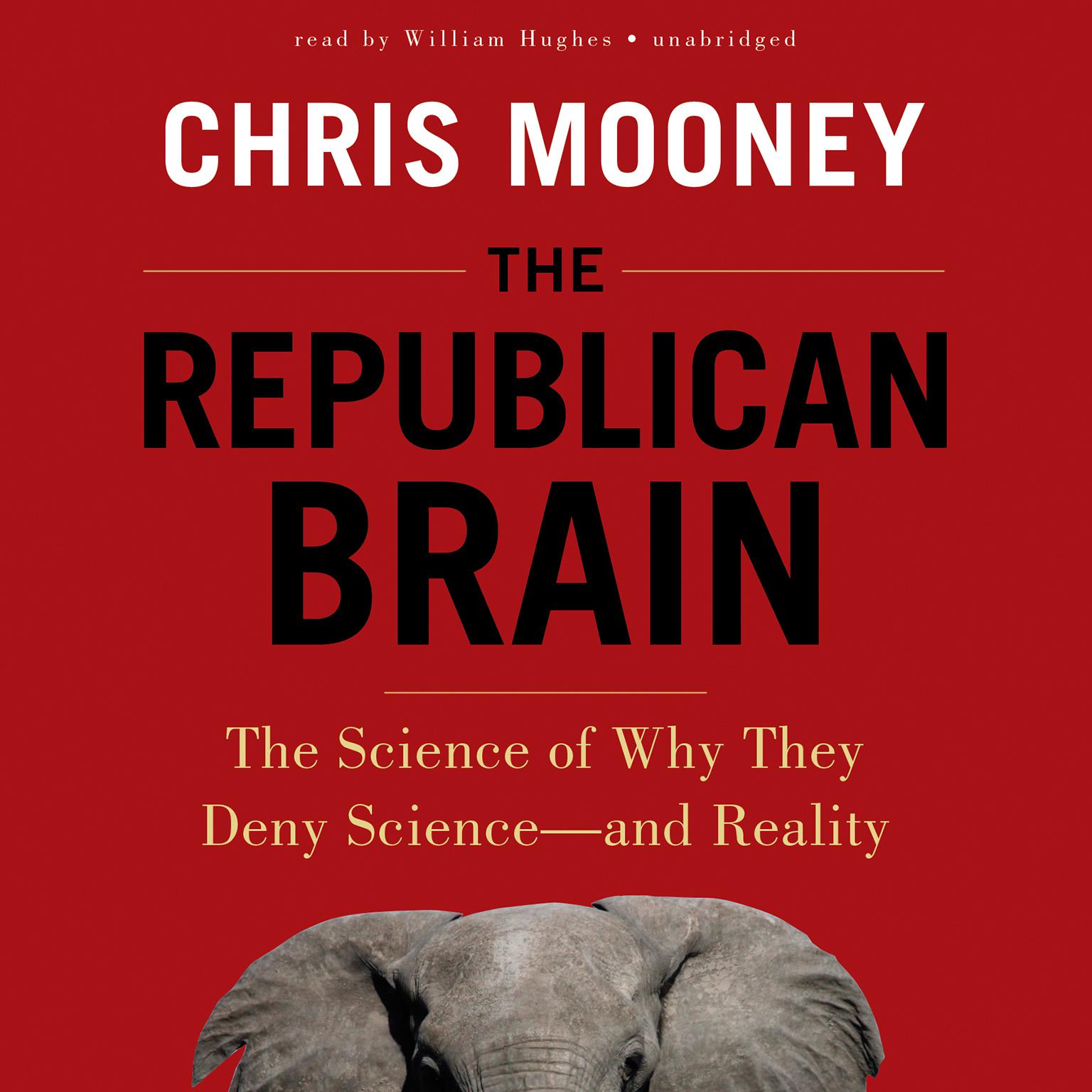 Play Audiobook Sample
Play Audiobook Sample
The Republican Brain: The Science of Why They Deny Science—and Reality Audiobook
 Play Audiobook Sample
Play Audiobook Sample
Quick Stats About this Audiobook
Total Audiobook Chapters:
Longest Chapter Length:
Shortest Chapter Length:
Average Chapter Length:
Audiobooks by this Author:
Publisher Description
Bestselling author Chris Mooney uses cutting-edge research to explain the psychology behind why today’s Republicans reject reality—it’s just part of who they are. From climate change to evolution, the rejection of mainstream science among Republicans is growing, as is the denial of expert consensus on the economy, American history, foreign policy, and much more. Why won’t Republicans accept things that most experts agree on? Why are they constantly fighting against the facts? Science writer Chris Mooney explores brain scans, polls, and psychology experiments to explain why conservatives today believe more wrong things, appear more likely than Democrats to oppose new ideas and less likely to change their beliefs in the face of new facts, and sometimes respond to compelling evidence by doubling down on their current beliefs.
Certain to spark discussion and debate, The Republican Brain also promises to add to the lengthy list of persuasive scientific findings that Republicans reject and deny.
Download and start listening now!
"This book explains the psychology behind the various political ideologies and is essential in understanding the behavior of the political parties. The researchers proved through scientific studies that people who identify themselves as conservatives have a much lower degree of openess to new ideas and information and they are much more loyal. In other words, they identify with a group or team and only accept facts which supports that team. Liberals on the other hand are much more likely to accept new information and change their political opinions. They don't have as much loyalty as conservatives and they are more likely to criticise their own groups and politicians according to new information. This explains why the conservative movement is in lock and step with each other and how liberals and democrats are more fractured. Party unity allows them to be stronger politically and to get things done but the ideological basis tends to be more delusional and divorced from reality. The author suggests that the different psychological traits may be genetic which means that party affiliation is partially hard coded into people's brains. The conservative trains may have been beneficial in paleolithic times when humans were organized into small bands and tribes where loyalty was more important than creative thinking. My own idea to add would be to discuss why some liberals are so loyal to their own group and politicians regardless of what they do. It suggests that there is a mixture such that openess may be applied to conservatives and vice versa in many situations, but less than the average. This book is essential to understanding the fundamental behavior of the various political parties and ideologies."
— Ob-jonny (4 out of 5 stars)
Quotes
-
“Drawing on a growing body of empirical research, he provides an intelligent, nuanced, and persuasive account of how conservatives and liberals tend to differ at the level of psychology and personality.”
— Financial Times -
“Mooney [is] a thoughtful and fair-minded critic of conservatism…The Republican Brain is an interesting and thought-provoking work.”
— Daily Beast -
“In the end, Mooney even goes so far as to argue that liberals and conservatives have complementary strengths, and if conservatives remain intransigently opposed to liberalism in America today, then it’s up to American liberals to learn the benefits of becoming more conservative, at least on the psychological level. It’s this dual nature of Mooney’s message (at least) that makes this book a good deal more interesting and important than it might at first appear to be, while also intentionally raising more questions than it can possibly answer.”
— al-Jazeera
The Republican Brain Listener Reviews
-
" Interesting, but not totally surprising, book describing how Republicans process information differently that the general population. In particular, it focuses on the tendency of Republicans to employ "motivated thinking" to hold on to current beliefs in the face of information that contradicts those beliefs. "
— Brian, 2/6/2014 -
" Interesting and very well sourced, although a little drawn out. It could easily be two-thirds of the length just by providing all the example themes once, instead of repeating them every chapter. "
— Lars, 2/5/2014 -
" libs should be less wussies and repubs should be less deluded "
— Tai, 12/20/2013 -
" Because of this book, I understand how powerful our tendencies toward motivated reasoning are and can explain why alcohol makes individuals more conservative! "
— Stephanie, 12/10/2013 -
" While it is interesting, you'll note that Mooney is actually not a very good writer. Well written research has flow, and sadly this does not. "
— Ian, 10/18/2013 -
" Want to re-read this. "
— pjreads, 6/6/2013 -
" Happy to see books that use science. Equally as hard on liberals as on conservatives. If you need proof that Americans are predominantly stupid this will provide it. "
— Stacy, 5/9/2013 -
" it was good but i would have liked more data "
— Zazu, 4/14/2013 -
" A phenomenal book that examines, in a fair, analytical (rather than emotional) manner, the psychology of ideology. Fantastic read. "
— Aaron, 11/30/2012 -
" some bias, but overall a good look at human behavior "
— Peter, 10/16/2012 -
" Interesting read, made a lot of sense. "
— Bill, 8/7/2012
About Chris C. Mooney
Chris Mooney is the bestselling author of The Republican War on Science, the host of the Point of Inquiry podcast, and the author of The Intersection blog for Science Progress. He has written several books, as well as articles for Mother Jones, American Prospect, Harper’s, Washington Post, USA Today, and Slate. He has appeared on The Last Word, The Daily Show, The Colbert Report, Book TV, Science Friday, Morning Joe, and Fresh Air, among other programs.
About William Hughes
William Hughes is an AudioFile Earphones Award–winning narrator. A professor of political science at Southern Oregon University in Ashland, Oregon, he received his doctorate in American politics from the University of California at Davis. He has done voice-over work for radio and film and is also an accomplished jazz guitarist.




